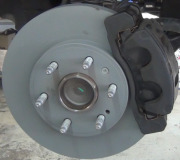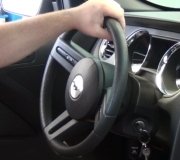If loosening the lines at the master cylinder let the brakes release, as you observed, there's two things to look for. One is the brake light switch is over-adjusted and is holding the brake pedal down a little. You can identify that by loosening the master cylinder's mounting nuts and letting it pull away from the booster 1/8" or so.
The more serious cause is when the brake fluid has been contaminated with a petroleum product. Running new fluid through the system won't solve that. The rubber seals in the master cylinder will grow past the fluid return ports and keep the fluid trapped when pressure builds up as the brakes get warm. The more the truck is driven, the harder the brakes will self-apply. One way to identify this is to observe the rubber bladder seal under the reservoir cap is blown up and mushy, and will be hard to press back into the cap.
The only proper repair for contaminated brake fluid is to remove all parts that contain rubber that contacts the fluid, flush and dry the steel lines, then install all new parts. That includes calipers and wheel cylinders, rubber flex hoses, combination valve, rear height-sensing proportioning valve when used, master cylinder, and ABS hydraulic controller. If any part is not replaced, including those that were replaced six months ago, the contamination will leach out of it and recontaminate the new fluid and parts.
Being a mechanic, you're familiar with a bleeder ball for bleeding brakes. An inexperienced mechanic at a mass merchandiser's auto shop used a funnel used for engine oil to fill the bleeder ball at his shop in the 1980s. He conscientiously wiped it out first with a rag, but no one ever explained to him how the residue was plenty to contaminate the brake fluid. He put over four gallons of fluid in the ball, then used it for the next brake job. That shop ended up doing thousands of dollars worth of repairs on over a dozen cars once they realized what had happened. We even used to run into this with older rear-wheel-drive cars when we used our hands to repack the front wheel bearings. Often we'd wipe our hands on a rag, then use a fingertip to poke the rubber seal back into the reservoir cap when we filled the brake fluid. The grease residue where we touched the seal was enough to contaminate the brake fluid.
I mentioned those horror stories to stress how little contamination can cause a big problem. I hope that is not what you find.
Wednesday, February 24th, 2021 AT 7:40 PM



